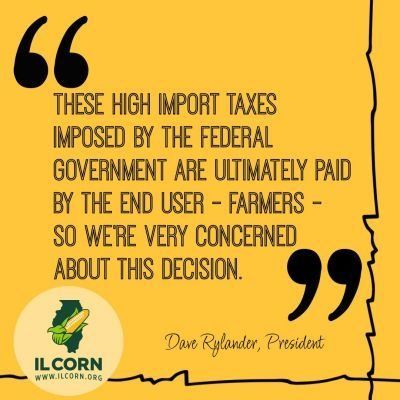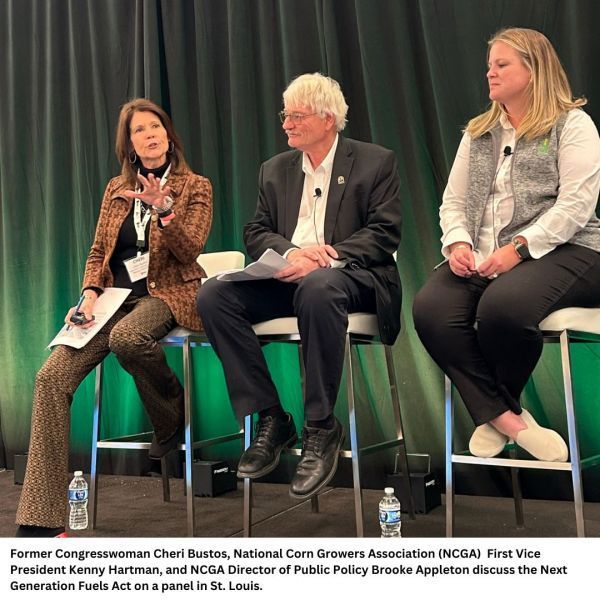Featured Article

January 29, 2024
Megan Dwyer, a valuable member of the IL Corn team, has clinched 4th place nationally in the American Farm Bureau Young Farmers & Ranchers Excellence in Agriculture competition. Megan's exceptional achievements reflect her dedication to agriculture, a passion cultivated through years of involvement with Farm Bureau. In this Q & A, Megan provides insights into her experiences with the county Farm Bureau and Young Leaders, emphasizing her journey from high school and FFA to her active role in the Henry County Farm Bureau . Megan's success is not a surprise to IL Corn, as her invaluable contributions to the team align seamlessly with her commitment to agriculture. As Megan reflects on her experiences and the things she cherishes about this achievement, it becomes clear that her passion for the industry is not just a job but a calling.

January 25, 2024
National Corn Growers Association Lead Economist Krista Swanson remains optimistic despite overseas obstacles for United States corn exports. Drought in Central America and turmoil in the Middle East have added time to trade routes and raised prices for ocean freight shipments. “The Panama Canal is really important when it comes to exporting corn and soybeans to some of the Asian countries in particular,” Swanson said. The Associated Press reports port authorities decreased crossings through the Panama Canal by 36% due to record drought. In 2022, the U.S. exported 17% of corn through the channel. On January 16, authorities announced an increase from 22-24 daily transits. However, the number paled to the canal’s typical 36-40 daily movements. A typical shipment through the Panama Canal takes U.S. grain approximately 32 days to reach Japan. Swanson said with the backups the Suez Canal is the next best pathway but takes shipments nearly 50 days. However, major shipping organizations are bypassing the Suez Canal and vying for alternative, longer routes after Houthi attacks in the Red Sea. The detours around the tip of Africa are expected to take 54 days or more. “Now we're looking at close to doubling the number of days at sea,” Swanson said. “Which really makes it more expensive to get grain to the destination.” IL Corn Director of Exports and Logistics Collin Watters said longer export routes drive up transit costs on U.S. grain shipments. Grain freight costs from the U.S. to Japan via the Panama Canal increased in August through December by more than 22% compared to early 2023—a 62% rise from pre-coronavirus rates. No Bull Ag Economist Susan Stroud reported the Red Sea detours alone have increased shipping transit fees by 5-15%. “There’s a finite number of boats and crews. So, if those boats are now on the water, sailing for a longer period then they aren’t available for other shipments,” Watters said. “Everything is interconnected. It adds a lot of inefficiency to the entire system causing freight costs to go up.” Watters and Swanson said Brazil, a top competitor for U.S. grain, is less effected by the backups. Grain exports from Brazil can travel around the Cape of Good Hope in Africa in 40 days—14 days shorter than the U.S. “The bigger concern is that competitors', mainly South American, freight operations haven't changed all that much,” Watters said. “They’re still able to make those movements from Brazil and Argentina to Asia the same way they normally would. Ultimately, their costs haven’t been as impacted as ours.” Swanson remains optimistic despite congestion at sea. She said nearly 50% of U.S. corn exports traveled to Mexico in the 2023-24 marketing year. “Certainly, ocean freight rates, distance and travel are not issues when we’re talking about Mexico,” Swanson said. “They’re a super important trading partner to the United States and corn grown in Illinois as well.” Swanson said ethanol production and corn feed demand also increased this year placing farmers in a good position despite shipment implications. After underwhelming grain exports last marketing year, Watters said he remains cautiously optimistic. “United States’ grain right now is very competitive in the world market,” Watters said. “Hopefully demand picks up and I'm sure that the American farmer will be able to satisfy that demand in the coming year.”

January 19, 2024
Bloomington – Last week, the US Department of Commerce set a tax of 7.41% on imports of phosphate fertilizer from Morocco and Russia, which is a decrease from the previous rate of 19.97%. The International Trade Commission also decided Wednesday night to maintain their initial determination that domestic industries suffered material harm from Moroccan imports. While Commerce’s new rate is a positive step, it’s higher than the 2.12% recommended in the administrative review. "Fertilizers represent a major cost of production for corn farmers, so we’ve been advocating for more competition in the marketplace,” said Dave Rylander, ICGA President and farmer. “These high import taxes imposed by the federal government are ultimately paid by the end user – farmers - so we’re very concerned about this decision. We will continue working to lower input costs where we can and want our corn farmers to know that their profitability is a top concern for us.”

January 18, 2024
1st Place – Lainie Clark - Fairfield FFA "Thank you so much to the IL Corn and Illinois Soybean Association for this opportunity. I would also like to thank my advisors, Mr. Curt Robbins and Mrs. Samantha Smith for their assistance throughout the project. I feel that it is important to continue to learn safer farming practices to ensure a better environment for years to come. I will use this money to further my education at Eastern Illinois University."

January 17, 2024
The IL Corn Growers Association and the ethanol industry have their foot on the petal in full support of the Next Generation Fuels Act in 2024. The bill, which sets a new clean fuel standard, was discussed by former Congresswoman Cheri Bustos, IL Corn Growers Association past president and National Corn Growers Association (NCGA) First Vice President Kenny Hartman, and NCGA Director of Public Policy Brooke Appleton on a panel at the NCGA Leadership and Action Team Meetings in St. Louis last week. Bustos, a partner at the public strategy firm Mercury , conveyed a bright future for the bill. “I want to be very upbeat about the Next Generation Fuels Act,” she said. “Because it can happen.” The legislation allows automakers to build cars that will utilize a more efficient and more powerful fuel, an ethanol blend that is higher in octane . The shift would lower carbon emissions nationwide and give consumers a lower price at the fuel pump.

January 12, 2024
The IL Corn Growers Association met today with leaders from agricultural organizations throughout the state to discuss policy goals for 2024. The Illinois Agricultural Legislative Roundtable featured speakers from the Illinois Department of Agriculture, Senate Agriculture, Nutrition and Forestry Committee, United States Trade Representative, and the United States Department of Agriculture’s Rural Development.

January 11, 2024
The new year offers many opportunities on the policy front, and my staff and I will spend the year building on the successes of corn grower advocates from 2023. Last year, we successfully convinced the Biden administration to take action in response to Mexico’s ban on biotech corn, made great progress in ensuring consumers have year-round access to E15 , won a round in our fight against tariffs on fertilizer imports, and set ourselves up for success in the upcoming farm bill reauthorization. But if we are buoyed by last year’s wins, we are also feeling the continued presence of its challenges, many of which promise to be more pronounced in the year ahead. One of the biggest challenges will be working with a divided Congress in which a slim number of seats is determining control of the U.S. House of Representatives, making it difficult to advance legislation. In fact, according to a recent New York Times analysis , there was less lawmaking in 2023 than at any other time in a decade. The article reports that, in 2023, the House held 727 votes but only enacted 27 laws. This is compared to 2022, when the House voted 549 times with 248 laws enacted. With what is sure to be a highly contentious presidential election on the horizon, we can only expect these challenges to intensify. Yet, I am convinced that, like last year, we can navigate the current climate and secure big wins for corn growers. Fortunately, NCGA has built close relationships with key members of Congress across party lines. Moreover, agricultural issues in general and corn grower priorities in particular, continue to enjoy bipartisan support. This is all good news, as we will need all the goodwill we can muster as we work to secure reauthorization of a Farm Bill that includes our priorities, including protecting crop insurance and getting Congress to make access to commodity programs fairer by updating base acres. Our relationships will also be important as we push the Biden administration to eliminate trade barriers and provide us with the tools we need to open and cultivate new markets. This work includes quickly resolving the impasse with Mexico over biotech corn and reducing tariffs on fertilizers imported from Morocco. We will continue to make the argument to Congress and the Biden administration that ethanol is key to achieving the country’s ambitious climate goals. The push to move the country to an all-electric fleet despite consumer preference presents us with an opportunity to continue to elevate the environmental benefits of ethanol. As part of these efforts, we are working to garner more congressional support for the Next Generation Fuels Act, which would help address the country’s most pressing energy issues through a transition to cleaner fuels and vehicles. These are but a few examples of our many priorities for 2024. With such an ambitious agenda, we are going to need your help. If you haven’t already, please sign up for IL Corn advocacy alerts or our National Corn Growers Association alerts and act when we notify you of pending legislation and issues. It won’t be easy, but, with your help and the help of our allies in Congress, our advocacy goals can be fully realized. I look forward to working with you and other corn grower advocates in 2024 to make this happen. Happy New Year! Appleton is vice president of public policy at the National Corn Growers Association.

January 11, 2024
Hear from Curtis Harms | 1st Place Winner: The picture is of my son Archer who’s almost 2. Along with Archer, my wife Nikki and stepdaughter Brin we are the fourth generation on our farm near Red Bud IL. My wife is a Kindergarten teacher in Milstadt IL, and I work as Maintenance Manager for Lime Production Company along with operating our family farm with my parents. We recently completed the purchase of the farmhouse and building from my parent’s 4th ensuring Archer will be the 5th generation to grow up on the farm. I have been active in the family farm since 2017 and have been taking more of a lead every year as my dad transitions into retirement but grew up “helping” my dad and grandpa for as far back as I can remember. Prior to becoming involved in the farming operation I served 11.5 years in the US Navy. This photo means a lot to me because it reminds me of what has been our farm’s definition of success since my dad was asked that question years ago. “Build a farm that the next generation will want to pass on to their children.” Archer won’t be two until March but this fall, he was already riding in the combine every chance he could, watching us work when he couldn’t ride along, and hopping right in and grabbing tools to run around with when I was making repairs (like this day when I had to replace a row unit drive on the corn head). Having a little one around to play with and see smiling on days when things aren’t going to plan makes harvest and planting far less stressful.
Articles
2026
2025
2024
2023
2022
2021
2020

